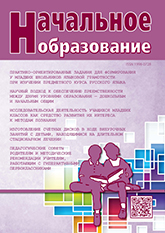CSCSTI 14.15
CSCSTI 14.25
The article substantiates the importance of didactic games as a method of teaching in primary school. The classification of games, including didactic ones, is given. The types of puzzles - riddles, puzzles, crosswords, are described, the rules for their compilation and use in the process of practical training during the course “Natural History with the teaching methodology of the subject “The-World-Around-Us””are described. The functions of didactic games at the initial stage of the development of the content of educational subjects by a younger schoolchildren, the acquisition of skills of educational activity, the development of its cognitive interest and creative independence are analyzed.
the importance of play in the development of the child; didactic game function in primary school; puzzle games: riddle, rebus, crossword; rules for making games; game as a teaching method; “the-World-Around-Us” lessons
1. Borisov L. Enciklopediya krossvorda [Crossword Encyclopedia]. St. Petersburg: «Neva» Publ.; Moscow: OLMA-PRESS Publ., 2001. 480 p.
2. Vinogradova N.F. Okruzhayushchij mir: metodika obucheniya. 1-4 klassy [The world around us: teaching methodology. Grades 1-4]. Moscow: Ventana-Graf Publ., 2005. 240 p.
3. Gorodkova T.V., Yolkina N.V. Detskie krossvordy: populyarnoe posobie dlya roditelej i pedagogov [Children's crosswords: a popular guide for parents and teachers]. Yaroslavl': Akademiya razvitiya Publ., 1998. 208 p.
4. Detskaya igra: teoriya, praktika, didakticheskie materialy [Children's game: theory, practice, didactic materials]. Yaroslavl': YaGPU Publ., 2013. 430 p.
5. Zagadki dlya detej s otvetami [Riddles for children with answers]. Sajt: «Zoogalaktika» [Site: “Zoogalaxy”]. Available at: http://zoogalaktika.ru/for-children/zagadki?gclid=CjwKCAiAluLvBRASEiwAAbX3GV_srt9OjiQ7_c5ODflRFvkebDZ7Iipl3Y8J6554EI7QgBqKhuBv0hoCFDUQAvD_BwE (accessed 13 March 2020).
6. Kak razgadyvat' rebusy / Sajt: rebus1 [How to solve puzzles / Site: rebus1]. Available at: http://rebus1.com/index.php?item=manual (accessed 13 March 2020).
7. Karpova E.V. Didakticheskie igry v nachal'nyj period obucheniya: populyarnoe posobie dlya roditelej i pedagogov [Didactic games in the initial period of study: a popular guide for parents and teachers]. Yaroslavl': Akademiya razvitiya Publ., 1997. 240 p.
8. Kuprina L.E. Zanimatel'naya geografiya Tyumenskoj oblasti: posobie dlya uchashchihsya i uchitelej geografii [Entertaining geography of the Tyumen region: a manual for students and teachers of geography]. Tyumen': GAUK TONB Publ., 2019. 220 p. EDN: https://elibrary.ru/QTCSPR
9. Kuprina L.E., Krylova L.V. Igry i razvlecheniya yunyh turistov-kraevedov [Games and entertainment for young local history tourists]. Igry s gotovymi pravilami: metodicheskie rekomendacii dlya uchitelej, rukovoditelej kruzhka [Games with ready-made rules: guidelines for teachers, circle leaders]. Tyumen': OblSYuTur Publ., 1990. 49 p.
10. Mironov A.V. Metodika izucheniya okruzhayushchego mira v nachal'nyh klassah [Methods of studying the world around us in elementary grades: a textbook for students of the faculties of pedagogy and methods of elementary education of pedagogical universities]. Moscow: Pedagogicheskoe obshchestvo Rossii Publ., 2002. 360 p.
11. Selevko G.K. Enciklopediya obrazovatel'nyh tekhnologij [Encyclopedia of educational technology]. Moscow: NII shkol'nyh tekhnologij Publ., 2006, V. 1, 816 p. Available at: https://drive.google.com/file/d/0B6xhkmsz1gLLb0JrazY3VENacnM/view (accessed 12 March 2020). EDN: https://elibrary.ru/QVDTKP
12. Karpov A.V., Shadrikov V.D., Karpova E.V. Sistemogenez igrovoj deyatel'nosti: metodologicheskie i teoreticheskie osnovy issledovaniya [Systemogenesis of game activity: methodological and theoretical foundations of research]. Sistemogenez deyatel'nosti. Igra. Uchenie. Trud [Systemogenesis of activity. The game. Doctrine. Work]. Moscow: «Dom RAO» Publ.; Yaroslavl': YarGU Publ., 2017, V. 2, 492 p. Available at: http://xn--n1abc.xn--p1ai/library/pdf/sistemoginez_2017_02.pdf (accessed 12 March 2020).
13. Sorokina A.I. Didakticheskie igry v detskom sadu [Didactic games in kindergarten]. Moscow: Prosveshchenie Publ., 1982. 96 p.
14. Sushinskaya L.L., Sheverdina N.A. Viktoriny, konkursy, krossvordy dlya nachal'noj shkoly [Quizzes, contests, crosswords for elementary school]. Rostov-on-Don: Feniks Publ., 2012. 315 p.
15. Shmakov S.A. Deti na otdyhe: prikladnaya «enciklopediya»: uchitelyu, vospitatelyu, vozhatomu [Children on vacation: applied "encyclopedia": teacher, educator, counselor]. Moscow: Dmitriev A.E. Publ., 2001. 175 p.
16. Shmakov S.A. Eyo velichestvo igra: zabavy, potekhi, rozygryshi dlya detej, roditelej, vospitatelej [Her Majesty's game: fun, fun, practical jokes for children, parents, educators]. Moscow: MIP «NB Magistr» Publ., 1992. 160 p.
17. Shmakov S.A. Igra uchashchihsya kak pedagogicheskij fenomen kul'tury. Dokt. Diss [The game of students as a pedagogical phenomenon of culture]. Sajt: «Rossijskaya gosudarstvennaya biblioteka» [Site: “Russian State Library”]. Moscow, 1997. 409 p. Available at: https://search.rsl.ru/ru/record/01000191105 (accessed 12 March 2020). EDN: https://elibrary.ru/NLKMBH
18. Shmakov S.A. Igry uchashchihsya - fenomen kul'tury [Student games are a cultural phenomenon]. Moscow: Novaya shkola Publ., 1994. 238 p. EDN: https://elibrary.ru/JHVMPJ






